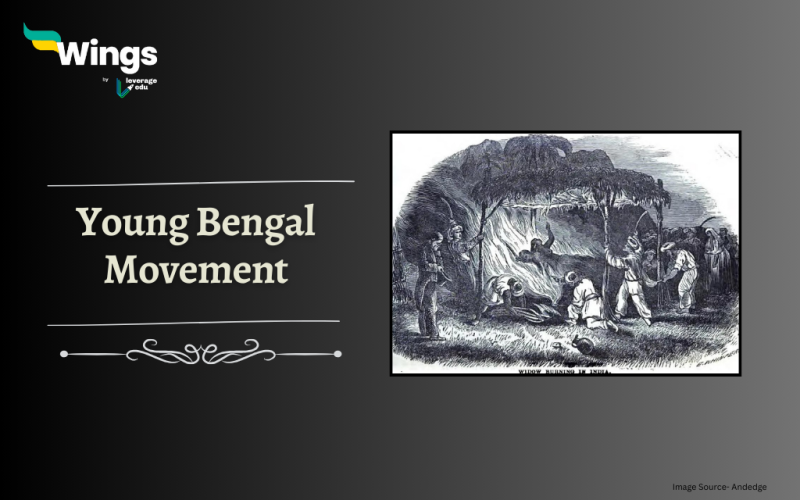The Young Bengal Movement was a significant socio-cultural and intellectual movement that emerged in Bengal, India during the early 19th century. Led by a group of young, educated Bengali intellectuals, this movement aimed to bring about social reform, challenge traditional customs and beliefs and advocate for modern ideals. In this article, we will explore the origins, objectives, and impact of the Young Bengal Movement.
Table of Contents
Who were the founders of the Young Bengal Movement?
Henry Louis Vivian Derozio was the founder of the Young Bengal Movement. Along with him, some other members are –
- Henry Vivian Derozio: Considered the founder and guiding force of the Young Bengal Movement, Derozio was an English teacher at Hindu College in Calcutta. He played a crucial role in shaping the ideology of the movement and inspiring young minds to challenge the status quo. Henry Vivian Derozio inspired his followers to adopt a spirit of free thinking, individualism, and critical analysis.
- David Hare: David Hare, a Scottish philanthropist, was instrumental in promoting the ideals of the Young Bengal Movement. He founded Hare School in Calcutta, which became a hub for intellectual debates and discussions. Hare’s emphasis on English education and the teaching of Western science and philosophy greatly influenced the movement.
- Radical Writers and Thinkers: The movement had a vibrant community of writers and thinkers who published their ideas in various journals and newspapers. Prominent figures like Ramgopal Ghosh, Raja Rammohan Roy, and Iswar Chandra Vidyasagar played significant roles in the discourse of the Young Bengal Movement.
Also Read – Brahmo Samaj: Founder, History, Significance
Origins of the Young Bengal Movement
The background for the origin of the movement was –
- The emergence of Education: The early 19th century witnessed a surge in education among the Bengali middle class all thanks to the efforts of the British East India Company’s educational policies. This newly educated class formed the core of the Young Bengal Movement.
- Western Ideals and Enlightenment: Exposure to Western ideas and philosophies, particularly through the study of English literature and European philosophy greatly influenced the young Bengali intellectuals. They were inspired by the ideals of liberty, rationality, and progress propagated by the European Enlightenment.
- Influence of Ram Mohan Roy: The social reforms initiated by the social reformer Ram Mohan Roy served as a major inspiration for the young intellectuals. Roy’s ideas on women’s rights, abolition of sati (the practice of widows self-immolating on their husbands’ funeral pyres), and promotion of modern education deeply influenced the Young Bengal Movement.
Also Read – Arya Samaj: History, Founder, Features, Significance
Objectives of the Movement
The main objectives of the movement were
- Social Reform: Young Bengal intellectuals vehemently criticized regressive social practices prevailing in Bengal society such as child marriage, female seclusion, and caste discrimination. They aimed to eradicate these practices and promote gender equality and social inclusivity.
- Questioning Orthodoxy: The movement sought to challenge the traditional religious customs and beliefs that dominated Bengali society. They questioned the authority of the Brahmins, challenged superstitions and advocated for rationality and scientific thinking.
- Religious Reforms: The movement also focused on challenging orthodox religious practices and superstitions. The Young Bengal intellectuals advocated for rationalism, questioning the authority of religious texts and promoting a scientific temper.
- Promotion of Modern Education: Education was at the forefront of the Young Bengal Movement’s objectives. The intellectuals emphasized the importance of scientific and modern education to advance society and promote critical thinking.
Impact of the Young Bengal Movement
The impact of the movement was widely seen in the region of Bengal. Some of them are-
- Intellectual Awakening: They played a pivotal role in awakening a spirit of intellectual inquiry and critical thinking among the educated Bengali youth. Their writings and debates on social and religious issues sparked intellectual fervour in Bengal.
- Catalyst for Social Reform: The movement’s relentless efforts to eradicate social evils and champion social equality had a long-lasting impact on Bengal society. The Young Bengal intellectuals worked towards the abolition of regressive practices, paving the way for a more progressive and inclusive society.
- Legacy of Literary and Cultural Renaissance: The movement gave rise to a literary and cultural renaissance in Bengal. The intellectuals produced works of literature, poetry, and drama that challenged traditional norms and celebrated the spirit of modernity and nationalism.
- Influence on Indian Nationalism: The Young Bengal Movement’s focus on political awakening and self-governance sowed the seeds for the Indian nationalist movement. Many of the leading figures of the movement later became great leaders in the Indian independence movement.
In conclusion, the Young Bengal Movement was a significant intellectual and social revolution in 19th-century Bengal. Led by dynamic young intellectuals, the movement challenged orthodoxies, advocated for social reforms, and promoted Western education. The impact of the movement extended beyond its time, bringing about a cultural renaissance and setting the stage for further social and political movements in India.
Relevant Blogs
| Nehru Report 1928 | Chandra Shekhar Azad |
| The First Round Table Conference,1930 | Poona Pact |
| What was the Sarkaria Commission? | Indigo Rebellion |
| Rajguru | Kheda Satyagraha |
This blog was all about the Young Bengal Movement. Stay informed about Indian history and broaden your general knowledge with our dedicated section.
 One app for all your study abroad needs
One app for all your study abroad needs













